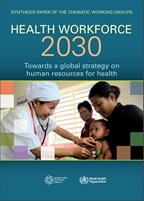About us
Health systems can only function with health workers; improving health service coverage and realizing the right to the enjoyment of the highest attainable standard of health is dependent on their availability, accessibility, acceptability and quality.
WHO estimates a projected shortfall of 11.1 million health workers by 2030 (1), mostly in low- and lower-middle income countries. However, countries at all levels of socioeconomic development face, to varying degrees, difficulties in the education, employment, deployment, retention, and performance of their workforce.
The chronic under-investment in education and training of health workers in some countries and the mismatch between education and employment strategies in relation to health systems and population needs are contributing to continuous shortages. These are compounded by difficulties in deploying health workers to rural, remote and under-served areas. Moreover, the increasing international migration of health workers may exacerbate health workforce shortfalls, particularly in low- and lower-middle income countries.
In some countries, challenges in universal access to health workers may also result from the lack of fiscal space to absorb the supply of health workers. As a result, some countries face the paradox of health worker unemployment co-existing with major unmet health workforce needs.
The High-Level Commission on Health Employment and Economic Growth found that investments in the health and social workforce can spur inclusive economic growth. The health workforce has also a vital role in building the resilience of communities and health systems and in emergency preparedness and response. Approximately 67% of the health workforce are women: investing in the health workforce is an opportunity to create decent employment opportunities, in particular for women and youth.
Our Team
All->Events
Call for consultation
Normative publications

Expanded programme on immunization prototype curriculum for nursing/midwifery schools in the WHO African...
Human resources are central to managing and delivering health care, including immunization services, to the population. Policy-makers, managers and pre-service...

Roles and responsibilities of government chief nursing and midwifery officers: a capacity-building manual
Current World Health Organization statistics reflect an improvement in a number of international health-related goals. According to WHO (2014a), there...

Human resources for health information system: minimum data set for health workforce registry
This document provides a standard-based tool for health workforce planners and decision-makers developing an electronic system or modifying an existing...

In 2013 the Board of the Global Health Workforce Alliance (GHWA) decided to facilitate the development of forward-looking strategic thinking on human resources...
Additional publications
Health topics
Related teams

